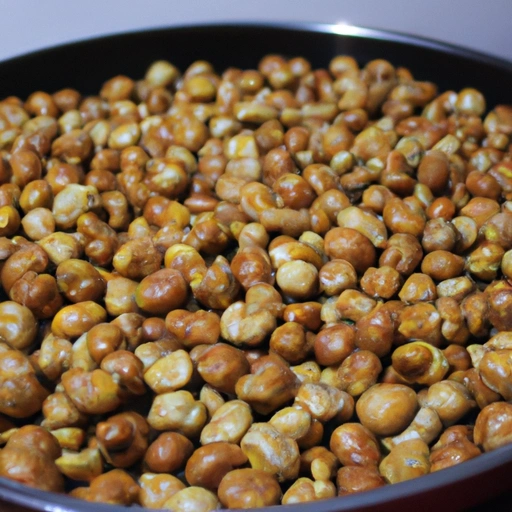Soynut
Description

Soynuts are a nutritious and crunchy snack made from whole soybeans that have been soaked, drained, and then roasted or baked until crisp. They are often consumed as a healthier alternative to traditional nuts due to their lower fat content and higher protein profile. Soynuts can be found in various flavors and preparations, serving as a versatile ingredient in a range of recipes, and can be enjoyed by people from various culinary traditions.
Common uses
Soynuts are commonly used as a snack, salad topping, and in trail mixes. They can also be ground into soynut butter, a peanut butter alternative. In addition, soynuts are used as a crunchy addition to stir-fries, baking recipes, and as a protein boost in smoothies.
Nutritional value
Calories
Soynuts typically contain about 120 calories per ounce (28 grams or approximately 29.6 mL).
Protein
Each ounce of soynuts provides around 10 grams of protein, making them an excellent source for muscle repair and growth.
Fat
With approximately 6 grams of fat per ounce, soynuts are lower in fat compared to many other nuts, and the fat present is mostly unsaturated.
Carbohydrates
They contain about 9 grams of carbohydrates per ounce, which includes dietary fiber beneficial for digestive health.
Vitamins
Soynuts are a good source of B vitamins, particularly vitamin B6 and folate, which are essential for metabolic processes.
Minerals
Rich in minerals, soynuts offer magnesium, phosphorus, potassium, and iron, supporting various bodily functions such as bone health and oxygen transport.
Health benefits
Soynuts contribute to heart health due to their unsaturated fats and fiber, can aid in weight management, and are beneficial for those with diabetes due to their low glycemic index. The isoflavones found in soynuts have been linked to a reduced risk of certain cancers and improved bone health.
Potential risks
Consuming soynuts in moderation is generally safe, but overconsumption may lead to gastrointestinal discomfort. Additionally, individuals with soy allergies should avoid soynuts, and there is some debate over the impact of phytoestrogens on hormonal balance.
Common recipes
Soynuts are used in energy bars, granola mixes, vegan cheeses, and as a crunchy topping for baked goods. They can also be found in various Asian dishes, where they add texture and protein.
Cooking methods
Roasting and baking are the most common cooking methods for preparing soynuts. They can also be soaked and blended for use in recipes as a dairy alternative.
Pairing with other ingredients
Soynuts pair well with chocolate, dried fruits, and spices like cinnamon and chili. They can also complement savory dishes, balancing flavors with their nutty taste.
Summary
In summary, soynuts are a healthful and adaptable food ingredient rich in protein and other essential nutrients. They offer a crunchy texture and nutty flavor that works well in both sweet and savory recipes, providing a satisfying option for those looking for nutritious snack alternatives or dietary inclusions.